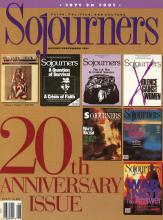I spent the month of January in India. Hence for the first several weeks of the Gulf war, the papers and editorials I was reading came from this populous Asian country to the east of the Arab world. The general outlook was highly critical of the war, which was seen primarily as an exercise in Western neo-colonialism, covered over with hypocritical moralism.
It thus was a double shock to return to this country in February to experience the national exhilaration with the annihilation of another country and the virtual repression of critical comment in the mainline media. For the first time in my life, the thought crossed my mind that I might want to disassociate myself from American citizenship.
I, along with many other people in what might broadly be called the American "peace community," have been trying to assess what really happened to this country during the first quarter of 1991. I am inclined to see this as a very ominous new stage in the exercise both of Western destructive violence and of repression of public dissent against that violence. It also is clear that American political elites understand that the conscience of the American people must be pacified to accept such destruction by an intense combination of patriotic and moralistic symbols and rhetoric.
Thus those of us who operate, in our criticism of international injustice, out of a conscious theological-ethical frame of reference are challenged to take particular responsibility to expose the falsity of this appeal to ultimate dualisms of good and evil, God versus Satan. For some years now, Third World liberation theologians have been naming the ultimate dimensions of the conflict in which we are involved as a conflict between state theology and the gospel. State theology fundamentally is idolatrous and demonic in nature, presenting the violent and cruel agendas of dominating power as an expression of God's redemptive order.
Read the Full Article

